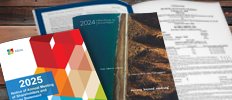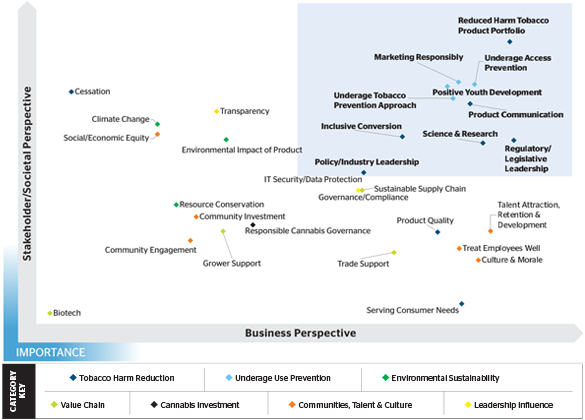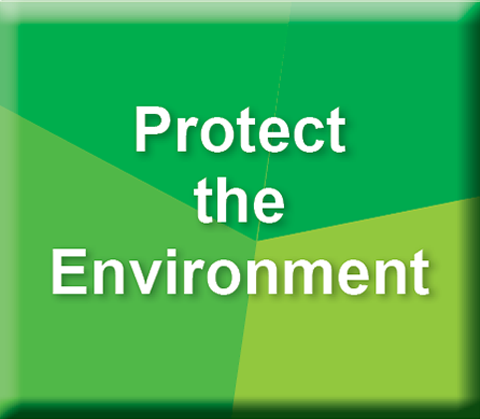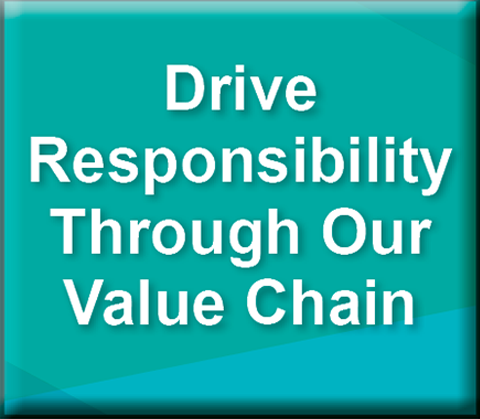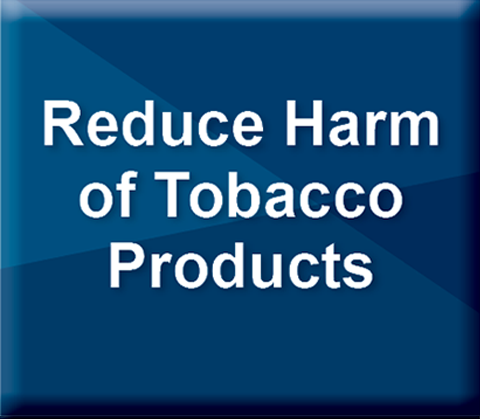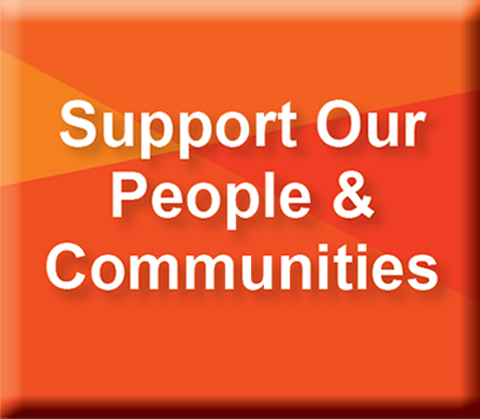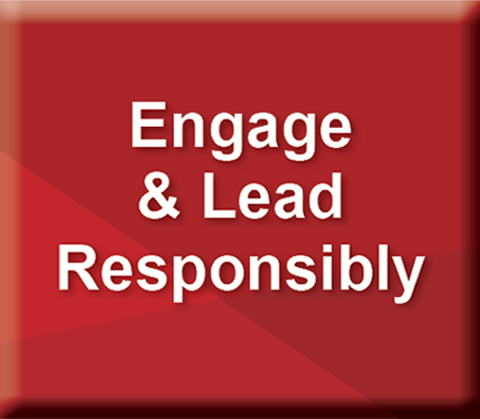
2020 Materiality Assessment
In 2020, we completed a new materiality assessment. We conducted a comprehensive review of stakeholder expectations and determined how those align with our business priorities. From this analysis, we established six responsibility focus areas to guide Altria’s actions toward achieving our Vision. Below will explain our assessment methodology, where we’re focused and why it matters, and how we will hold ourselves accountable to progress.
Identifying What Matters Most
Altria’s responsibility focus areas and initiatives are guided by our materiality assessment process – a comprehensive, formal approach to identify the most impactful ESG issues that promote long-term sustainability and success. To facilitate and oversee this assessment, we established a "Responsibility Leadership Board", made up of 15 of our companies’ most senior leaders. These leaders represented Altria’s operating companies and service organization functions such as the field sales force, corporate citizenship, corporate governance, compliance, government affairs, human resources, market research, procurement, product development, packaging, regulatory affairs and sciences, and strategy and business development.
Through this assessment, we solicited stakeholder input and conducted a comprehensive review of stakeholder expectations to determine how those align with our business priorities. We then established Altria’s Responsibility Focus Areas, as well as goals and metrics within each, that would guide our actions between 2021-2025.
To arrive at our six responsibility focus areas, we asked for input from stakeholders including: employees, consumers, growers, suppliers, trade partners, government officials, community and youth serving organizations, public health, non-governmental organizations and the general public. We relied on direct outreach, employee engagement surveys and focus groups, and public opinion research.
Through formal qualitative and quantitative research, we solicited input from the general public and engaged citizens, adult tobacco and wine consumers 21+, parents and caring adults, policy makers and employees. In total, across projects spanning 2019-2020, Altria’s research partners conducted 40 focus groups with more than 300 participants, more than 400 in-depth interviews and surveyed approximately 9,500 people representing these various stakeholder groups. We also solicited input from the Nominating, Corporate Governance and Social Responsibility (“NCGSR”) committee of Altria’s Board.
Next, we analyzed the feedback across all stakeholder groups, clustered like topics and expectations into more than 100 distinct responsibility expectations, and compiled these into 30 key issues for further exploration. We also shared a summary of the feedback with the full Board of Directors.
Stakeholder research to support Altria’s 2020 materiality assessment included specific questions:
- What risks and/or opportunities do you believe to be most impactful to Altria and necessary to address for long-term sustainability and success?
- What are your main expectations of Altria and its operating companies?
- How do these expectations differ, if it all, from expectations you have of other companies?
- What do you believe is the most important thing (or among the most important things) for Altria and its operating companies to focus on to act as a responsible company over the next five years?
- How might Altria’s business practices need to change to meet these expectations?
- How do you want to hear about Altria’s responsibility practices and progress in the future? (e.g., channels, cadence/frequency)
Prioritizing Responsibility Topics
A critical step in the materiality process is to prioritize top issues based on environmental, societal and business impact. For Altria, this included a mapping exercise. We evaluated the importance of each issue to our business, our stakeholders and society. We considered the alignment to Altria’s Year Vision, impact of the risks and opportunities, and external trends.The Responsibility Leadership Board then combined these issues into higher-level categories: a) Tobacco Harm Reduction, b) Underage Use Prevention, c) Value Chain, d) Communities, Talent & Culture, e) Environmental Sustainability and f) Altria’s Cannabis Investment.
These initial six categories represent a set of expectations that Altria intends to address over the next five years to responsibly lead progress toward our Vision. For each category, a team of Responsibility Leadership Board members and subject matter experts analyzed the issues’ impacts on Altria’s long-term sustainability success.
These “Issue Teams” documented their analyses of the essential nature of the category, stakeholders impacted, strategic importance for our business and beyond our walls, alignment with existing initiatives or strategy, and significant challenges and desired outcomes for progress.
Prioritization Map
(Click image to expand)
Each issue impact analysis for the six categories identified in our prioritization map consisted of the following elements:
- Issue Articulation. A succinct statement of the topic area.
- Primary Stakeholders Impacted. The stakeholders impacted and the significance/importance of this issue area to each stakeholder group.
- Strategic Importance/Criticality for Business (through 2025). Alignment to our Vision, current and future risks, and market opportunities or innovations.
- Strategic Importance Beyond Our Walls (through 2025). Identify potential economic, social and environmental impacts.
- Management Strategy. Identify current/planned initiatives through 2025. Propose any new initiatives/priority work for consideration.
- Most Significant Challenges for Managing/Making Progress. Highlight new or existing resources required.
- Desired Outcomes/Goals & Associated Metrics. Provide ideas as to the right goals for Altria to set and report progress against to external stakeholders including measurable/quantifiable metrics.
- Additional Considerations. Capture remaining questions or additional considerations.
“How” is as Important as “What”
In addition to these six categories, two significant themes emerged: leadership influence and principles of governance. How Altria leads to address issues is as important to our stakeholders as where we’re focused. Stakeholders acknowledge Altria’s industry leadership, and they expect us not only to lead in contributing to solutions for challenging issues, but also to influence others in the tobacco industry, government and communities to do the same. Ongoing and increasing expectations related to accountability, transparency and stakeholder partnership are applicable to the systems, processes, policies and reporting that govern Altria’s actions within each focus area.
Our 2025 Responsibility Focus & Goals
Based on the prioritization assessment, the Responsibility Leadership Board recommended, to Altria’s Executive Leadership Team, a final set of responsibility focus areas through 2025. The issue impact analyses helped inform the specific scope of priorities, including a clear set of goals to guide our efforts. In prioritizing these responsibility focus areas and goals, we are committed to continuing to seek and address stakeholder expectations while advancing outcomes that positively impact our business.
Responsibility Focus Areas
(Click a focus area below to learn more.)




